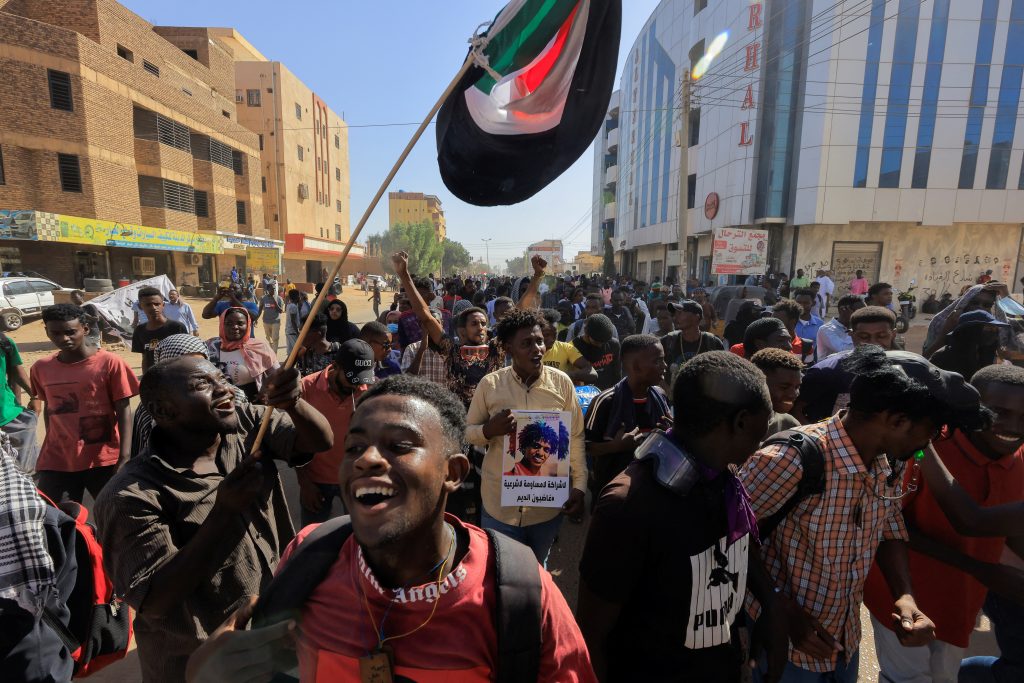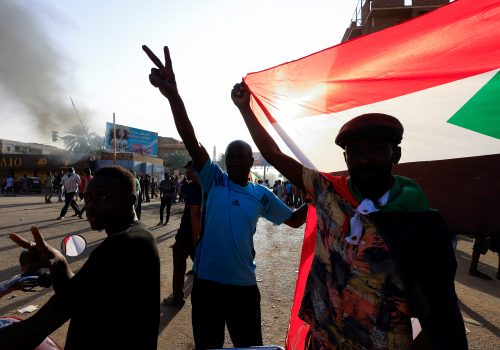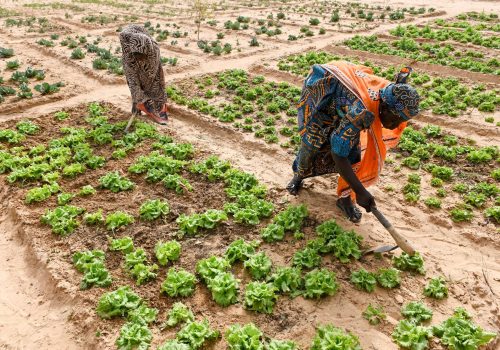The 2019 Sudanese revolution was a uniquely inspiring moment for the world. The road to Sudan’s new dawn was paved by the extraordinary courage and tenacity of its citizens to liberate themselves from dictatorship and civil war, address historical wrongs, and rebuild their state on the principles of democracy and justice.
The international community then committed to supporting Sudan’s transition toward democratization, reconstruction, and sweeping reforms across politics, economics, and the security structure to meet the aspirations of the country’s people after the revolution.
Yet the transitional process began to unravel almost immediately after the overthrow of the government of Omar al-Bashir on April 11, 2019, amid turmoil and instability. The Transitional Military Council—the military junta that took power after Bashir’s ouster—and the Forces of Freedom and Change (FFC)—a coalition of civilian and rebel groups—agreed on the Constitutional Charter and on the formation of a Sovereignty Council to lead the country during the transition to democracy through fresh elections. The Juba Peace Agreement (JPA) between the transitional government and rebel groups in October 2020 appeared to be cementing those gains toward peace and democracy.
On October 25, 2021, however, a military coup upended that progress. Now, as the international community and domestic Sudanese actors, including the military and civilian groups, work toward a restoration of democracy, a number of challenges confront them. How they address them could either make or break the dreams of the young Sudanese behind the 2019 revolution.
A fresh start
The United Nations Integrated Transition Assistance Mission in Sudan (UNITAMS), African Union, and Intergovernmental Authority on Development have helped restart dialogue and have initiated a road map for transition. On December 5, 2022, the army, FFC, other political forces, civil society organizations, and some youth resistance committees signed a framework agreement to establish a civilian government to manage a democratic transition for two years, ending with free and fair elections.
Planning for general elections after a short transitional period must incorporate creative arrangements that account for the multiple political, security, and economic crises that Sudan faces.
The prospects for elections in Sudan must be discussed within the framework of the transition process as a whole. A crucial decision to be made by the political actors is the timing and sequencing of the election in relation to other transitional tasks, including peace-making and implementation or revision of the JPA, transitional justice, dismantling the power structures of the previous regime, economic reform, and constitution-building.
The election dilemma
The relationship between elections and constitution-building is particularly important. If elections are to be held, the question is to what? There must be some body—with a defined constitutional structure, powers, roles, and terms of office—that is being elected, and which once elected can fulfil its mandate.
Holding credible elections means more than the elections themselves being free and fair. It also means that the parameters defining the body to be elected must be broadly accepted and legitimate. Without that, losers of the election will challenge the legitimacy of the elected institutions, while the winners will push their victory to extremes and potentially have no limits in power. It’s an invitation to instability.
There is no scope for elected institutions under the 2019 Constitutional Charter. In August 2022, the Steering Committee of the Sudanese Bar Association (SBA) proposed a new draft constitution as a framework for restoring the democratic path and regulating the procedures of the transitional period. This draft did not provide provisions for holding elections. All its institutions are appointed, not elected. This is because, until now, it has always been assumed that the transition will culminate with elections, rather than elections being part of a broader transitional process. The requirement for elections to be held at the end of the transitional period is specified in Article 13 of the JPA.
This is unusual. Often elections happen at some point in the middle of a transition process. In many cases, transitional institutions—such as a constituent assembly—are elected under a transitional constitution, and a final or permanent constitution is then developed by that elected body.
Elections or Constitution: What comes first?
The requirement that elections will happen only at the end of the transition places a huge burden on unelected transitional institutions to develop a permanent constitution before elections can take place.
Holding elections after the transitional period, and not in the middle of it, also means the transitional period has to be relatively short. Elections, which are vital to public legitimacy and to the establishment of normal institutionalized politics, cannot be postponed indefinitely. At some point the people of Sudan must decide on who and how they will be governed.
Yet there is reason to be concerned that there might not be enough time to develop a permanent constitution, based on a sufficient consensus, before the planned end of the transitional period.
There are only three (non-attractive) possible solutions:
- Amend transitional constitutional documents, to allow for elections to transitional institutions, before the end of the transition process, with a permanent constitution to be developed after the election—although that is against Article 13 of the JPA.
- Rush permanent constitution-building, to get a constitution in place before the scheduled end of the transition, with necessary compromises on the quality of document and on the extent to which the process can be fully inclusive.
- Delay elections indefinitely until after the completion of permanent constitution-making, which may result in the ebbing away of the legitimacy of transitional institutions and raise the risk of extra-constitutional military intervention.
Whatever the case, the signatories to the Framework Agreement have begun to hold stakeholder conferences to discuss four fundamental issues necessary for signing the final political agreement: security sector reform, transitional justice issues, the regional case of eastern Sudan, and the issue of amending the JPA.
It is important to make use of these ongoing consultations to discuss extending the transitional period to accommodate institutional and legislative reforms and the necessary logistical preparations for elections. The international community, including UNITAMS, can help transfer technical expertise, international experiences, lessons learned, and resources to assist a democratic transition and plan elections, and to support sustainable peace and stability in Sudan.
Aside from the constitution, Articles 12 and 13 of the JPA establish other preconditions for the holding of credible elections. They include:
- arrangements for international monitoring
- implementation of the agreed-upon plan for the voluntary return of the displaced and refugees
- the conduct of the population census, “in an effective and transparent manner before the end of the transitional period, with international support and oversight”
- the enactment of a Political Parties Law
- the formation of the Electoral Commission
Similar preconditions are also specified in the draft constitution presented by the SBA. Additionally, it is necessary to conduct a campaign to make voters aware of the new constitution and of the electoral system.
This is a lot to do, and Sudan is starting from a low baseline. If the transition period is to be just two years, Sudan will require considerable technical support, and investment of resources, to meet the requirements of the JPA and the SBA’s draft transitional constitution.
Role of the international community
Since the formation of the transitional government in August 2019, a broad international campaign has been launched to support the democratic transition in Sudan. My organization, the International Institute for Democracy and Electoral Assistance (International IDEA), has joined this effort by providing technical support to the transitional government, especially in supporting the formation of the Electoral Commission and the Constitution Making Commission, and in enacting laws related to these commissions. This support from international institutions must continue and be consistent with the political changes that occur.
There is a mandate for such support. Security Council Resolution 2425 of 2020, establishing UNITAMS, gave the UN mission in Sudan a mandate to provide assistance related to the transition and peace. Given the scale of the task and tight deadline, such financial and programmatic support must be provided urgently. Much of the preparatory work, both on elections and on the constitution, can be started now, for example the formation of working groups and technical committees.
There is also precedent for this support. The Electoral Assistance Mission in Iraq was formed within the larger Iraq mission, pursuant to UN Security Council Resolution No. 2576 (2021), to provide advice, support, and technical assistance to Iraq in planning, preparing, and conducting elections and referendums. Similarly, the European Union delegation assisted Jordan (2016) and Lebanon (2022). The African Union deployed, in May 2019, a team of observers and a team of technical experts ahead of the elections in Malawi.
The threats that may result from holding elections amid challenging security conditions—including the weaknesses and divisions within the state’s security institutions—cannot be overlooked. In addition to financial and logistical assistance, an international assistance mission should provide a qualified, trained, and experienced security force.
No time to waste
It is necessary to start soon and move fast to help build political consensus around the design of the process and the sequencing of the transition.
Failure to reach a political agreement on the electoral processes, on the constitutional structures that give rise to elections, and on legal rules regulating elections, may cause political tension, which could disrupt the elections and undermine the democratic transition.
The opportunities currently available to the Sudanese people to discuss issues of democratization, including the issue of organizing free and credible elections, with the help of the international community, might not last forever.
The international community needs to provide substantial support for the coming elections in Sudan at the end of the transitional period. This is vital for security, peace, and political stability in Sudan and the Horn of Africa. Failure to do so would create security, political, and social risks that are difficult to count—or predict.
Sami A. Saeed is the head of the Sudan program at the International Institute for Democracy and Electoral Assistance. He previously served at the United Nations as a legal advisor in the Office of the Special Representative of the Secretary-General for Sudan from 2006–2020.
Related content
Image: Protesters march during a rally against a signed framework deal between political parties and the military that provides for a two-year civilian-led transition towards elections and would end a standoff triggered by a coup in October 2021, in Khartoum, Sudan December 8, 2022. REUTERS/Mohamed Nureldin Abdallah



